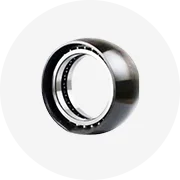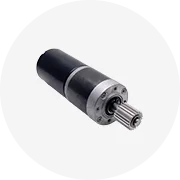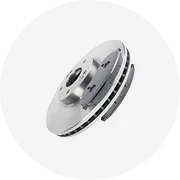
Best Agricultural Machinery Chain For Harvesters Strong Stainless Steel Agricultural Machinery Chains For Every Field


Sprocket Customized Coal Mine Scraper Conveyor Double Row Sprocket High Quality Carbon Steel Sprocket













Sprockets are mechanical wheel-like components with teeth, or cogs, which mesh with a chain, track, or other perforated or indented material. They are an integral part of many types of machinery where they serve to transmit rotary motion between two shafts where gears are unsuitable or to impart linear motion to a track, tape, etc. Unlike gears, sprockets are never meshed together directly and are designed to work with a specific chain or track.
These components are essential in many industries and applications, such as conveyors systems in manufacturing plants, bicycles, motorcycles, automobiles, tracked vehicles, and other machinery. The basic principle behind a sprocket's functionality is straightforward: as the sprocket rotates, its teeth catch on the links of the chain, moving the chain along with any attached load. This simplicity in function allows for efficient power transmission across a variety of applications.
Sprockets are designed to be durable and can be made from various materials such as metal or plastic depending on the application's requirements. They must withstand the forces they encounter during operation without slipping and while maintaining alignment with the chain or track. Proper sprocket and chain interaction is crucial to ensure smooth operation and to extend the lifespan of both components.
In the realm of power transmission parts, sprockets come in various shapes and sizes tailored for specific functions and applications. Here's an overview of some common types:
Drive Sprockets: These are connected to the motor or engine output shaft and initiate the movement of the chain. They are common in vehicles and machinery where they transfer power from the engine to the system.
Idler Sprockets: These do not transmit power but are used to guide the chain or adjust tension within the system. They often feature a ball bearing to reduce friction as the chain rolls over them.
Roller Chain Sprockets: Typically used in conveyor systems and machinery, these have evenly spaced teeth that match perfectly with the rollers in the chain. They are designed for smooth engagement and power transmission efficiency.
Double-Duty Sprockets: These have two sets of teeth at different diameters which allow for varied speed ratios and can engage two chains at once if needed.
Timing Sprockets: Also known as synchronous sprockets, they are designed for timing belts in engines and precision machinery where timing is critical.
The type of sprocket suited for a particular use case will depend on factors like torque requirements, speed, load, and environment in which it operates.
Selecting the right sprocket for your business involves considering several factors that pertain to your specific needs in terms of equipment performance, longevity, and efficiency. The choice of material is important; options like stainless steel, carbon steel, or even plastic each offer different benefits in terms of strength, durability, resistance to corrosion, and cost.
Customization support may also play a significant role in your decision-making process. OEM (Original Equipment Manufacturer), ODM (Original Design Manufacturer), and OBM (Original Brand Manufacturer) support can ensure that you receive a product tailored to your equipment’s specifications.
When evaluating sprockets for industrial use, consider attributes such as tensile strength for heavy-duty applications or heat treatment processes like hardening that can extend service life. The processing method can also impact quality; options like forging or CNC machining offer precision that might be crucial for your operations.
Another critical factor is whether standard or nonstandard sizes are required based on your equipment model. Finally, additional features like surface treatment for extra durability or tooth profile optimized for specific chains should align with your machinery’s demands.
For businesses looking to source sprockets efficiently and reliably, Alibaba.com stands out as an exceptional platform. With an extensive selection tailored to various industries—from construction works to agricultural equipment—Alibaba.com connects you with suppliers that cater to your precise needs. This includes not just standard models but also specialized ones that can be customized through OEM, ODM, or OBM services.
Alibaba.com's global reach ensures that you have access to a wide range of materials and manufacturing processes from suppliers around the world. Whether you need sprockets made from durable carbon steel for heavy machinery or lightweight aluminum for high-speed applications, you’ll find options available on this platform. Plus, Alibaba.com’s Trade Assurance service ensures that your payment is protected until delivery is confirmed.
The convenience doesn't end there; Alibaba.com offers features such as mobile buying capabilities and multilingual communication tools which streamline the procurement process. This focus on providing a user-friendly experience makes Alibaba.com not just a marketplace but a comprehensive solution for sourcing industrial parts like sprockets globally.
Sprockets are made from a variety of materials, including stainless steel, carbon steel, aluminum, and various plastics. The choice of material depends on the application's requirements for strength, corrosion resistance, and weight.
Yes, sprockets can be customized to meet specific needs through OEM, ODM, or OBM services. Customizations can include alterations in size, material, tooth profile, and added features like heat treatment.
Correct sprocket sizing is based on the pitch of the chain or track it will engage with and the desired speed or torque transmission. It's important to consult machinery specifications or a professional to determine the appropriate size.
Standard sprockets conform to industry-standard dimensions and specifications, while nonstandard sprockets are made to fit unique or specialized machinery that does not adhere to these standards.
The tooth profile of a sprocket must match the chain or track it engages with to ensure efficient power transmission and reduce wear on both components. Different profiles are designed for specific types of chains and applications.
Heat treatment processes like hardening or high-frequency quenching are used to enhance the durability and wear resistance of sprocket teeth, extending their operational life in demanding environments.
Yes, there are sprockets designed for various industries with specific requirements. For example, food-grade sprockets for processing plants may differ from those used in heavy construction machinery.
Machinery test reports are often available from suppliers upon request. These reports provide valuable information about the performance and quality of the product.
For high-torque applications, consider a sprocket made from materials with high tensile strength and one that has undergone suitable heat treatment processes to withstand the increased stress.
Surface treatments such as blackening, galvanizing, or polishing can protect against corrosion, improve wear resistance, and extend the lifespan of a sprocket.
While Alibaba.com primarily caters to B2B sales and bulk orders, it is possible to order a single custom sprocket depending on supplier capabilities and minimum order requirements.
To ensure compatibility, provide detailed specifications of your existing system when ordering. This includes chain pitch, diameter requirements, material preferences, and any other relevant details.
When requesting a quote for custom sprockets, provide information such as quantity required, material specifications, dimensions (including pitch diameter and bore size), tooth profile, any necessary custom features like keyways or set screws, and surface treatment preferences.